Traditionally, the 7 Wonders of the World is a list of spectacular human-built structures from ancient times. An updated New7 Wonders list was made a few years ago, but what is still missing is a sporting version.
Although the list has changed over time, the commonly accepted list of the Seven Wonders of the Ancient World are: Great Pyramid of Giza, Colossus of Rhodes, Hanging Gardens of Babylon, Lighthouse of Alexandria, Mausoleum at Halicarnassus, Statue of Zeus at Olympia, Temple of Artemis at Ephesus.
Of these, the only one with sporting links is the Statue of Zeus. The ancient Olympic Games were held in honor of their King of gods, Zeus. In the ancient Greek city of Olympia, sculptor Pheidias carved the enormous statue of Zeus, in the 5th century B.C.. It was made of gold and ivory and was said to be 40 ft high. Unfortunately, the Statue of Zeus is not around for us to admire today, though there are some ancient sites with sporting links that you can visit, which we have listed on our 7 Ancient Wonders of the Sporting World.
Greece is the birthplace of the Olympic Games, and ancient sporting wonders located from that area make up a few on my list. As with the 7 Wonders tradition, they are presented without ranking. See more about the Seven Sporting Wonders of the World project and a few other lists.
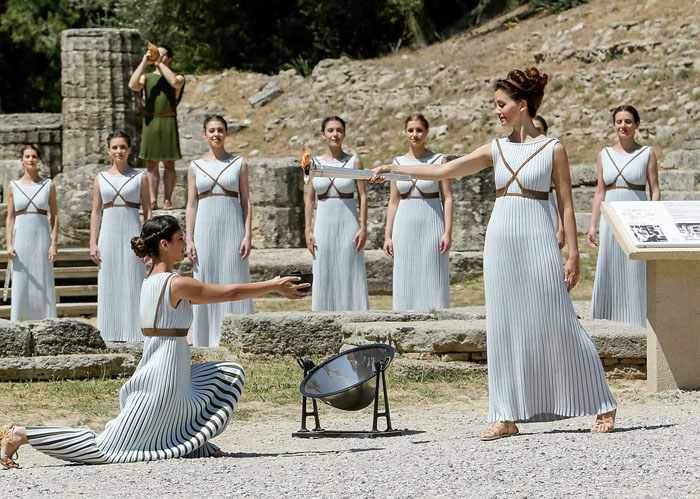 Olympic flame lighting ceremony at Olympia, Greece
Olympic flame lighting ceremony at Olympia, Greece Olympia — The first recorded ancient Olympic Games were held in 776 BC, held in Olympia, Greece. The Olympic Games torch relay all starts at the ancient site of Olympia in Greece, where a flame is ignited at the Temple of Hera in Olympia by the sun rays reflected off a curved mirror, and then is kept burning until the closing of the Olympic Games. The Olympia site is a long trek from Athens, but a worthy pilgrimage for the fan of sports.
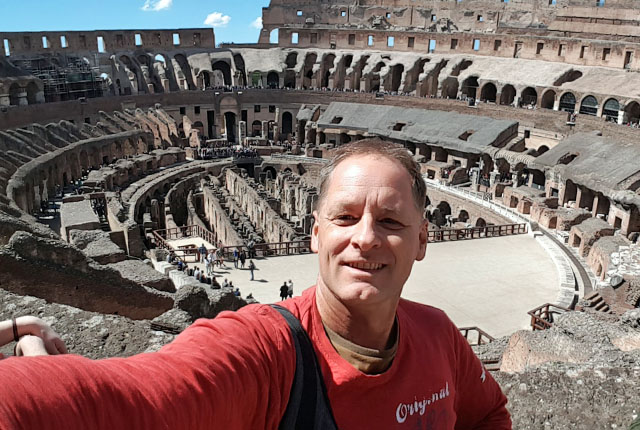 visiting the Colosseum in Rome, Italy
visiting the Colosseum in Rome, ItalyThe Colosseum — The Colosseum in Rome was one of the first great classic stadiums, built in 80 AD, and is considered the father of all modern stadiums. The arena was primarily a stage for combat, much like the sporting events of today. You can join the thousands of tourists to Rome who visit it daily for a glimpse of what it was like in the times of gladiators.
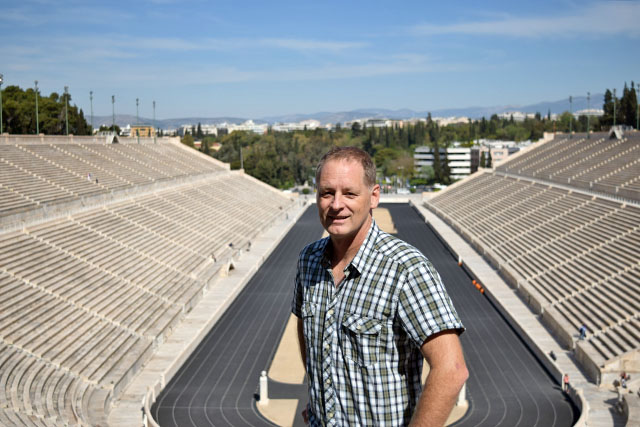 visiting Panathinaiko Stadium. Athens, Greece
visiting Panathinaiko Stadium. Athens, GreecePanathenaic Stadium — The Panathenaic stadium in Athens was the venue for the first Olympic Games in 1896, though this stadium was first built in 330 BC for the Panathenaic Games. It was rebuilt in 144 AD using marble, and some of its majesty can be viewed first hand, a short walk from the city center of Athens.
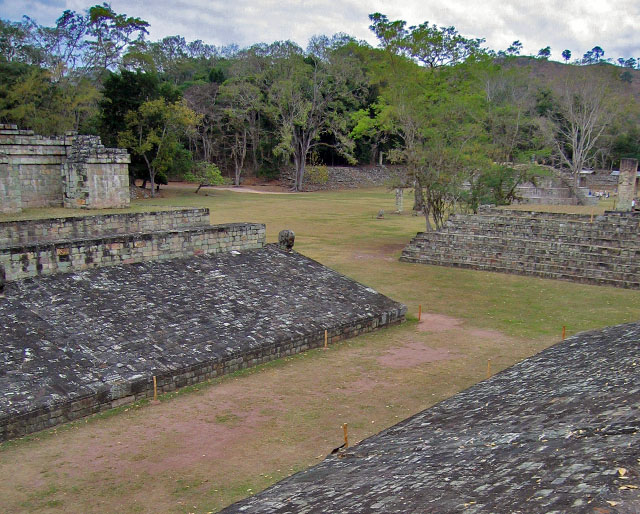 the ball court at Copán in Honduras
the ball court at Copán in HondurasMesoamerican Ballcourt — There are over a thousand ballcourts identified that were used to play the Mesoamerican ballgame, possibly the largest and most iconic example is the Great Ballcourt at Chichen Itza, Mexico.
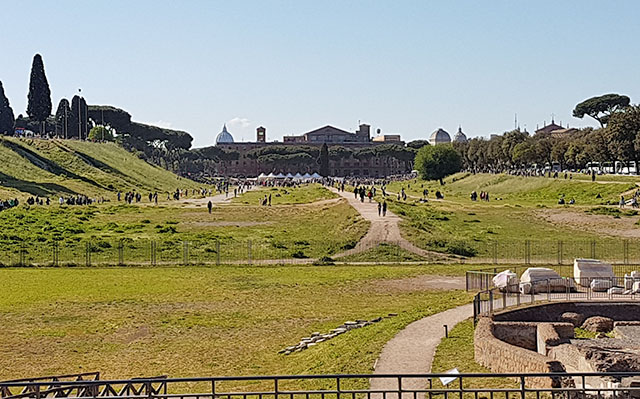 Circus Maximus is now a large park
Circus Maximus is now a large parkCircus Maximus — This once large open-air stadium is now a large public park, but is it not hard to imagine sitting on the banks watching chariot races around the track in ancient Roman times.
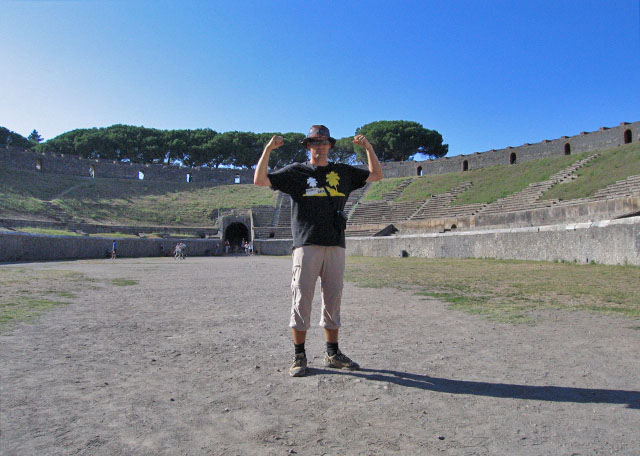 Stadium in Pompeii ruins
Stadium in Pompeii ruinsPompeii Stadium — It's the oldest surviving Roman amphitheater, aided by being buried by the eruption of Vesuvius in 79 AD.
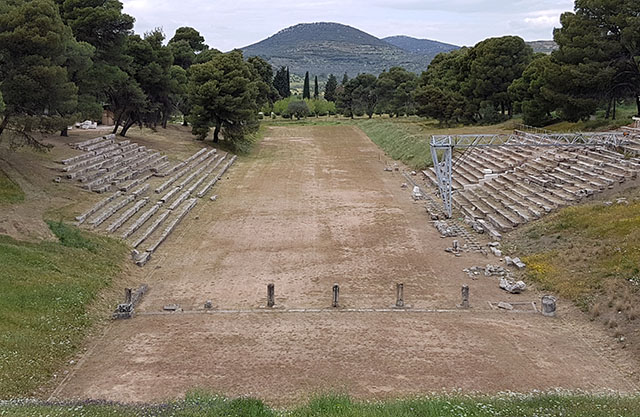 Epidaurus Stadium
Epidaurus StadiumEpidaurus Stadium — is located next to the Sanctuary of Asclepius in Epidaurus. The stadium was constructed in the 5th century B.C. to host nude athletic games every four years to honor Asclepius, the god of healing. Visitors today can still see the starting pillars and some of the stone benches for spectators.
----
Here are a couple of other ancient sporting wonders that did not make my top seven.
- Phoenician Stadium north of Amrit, Syria
- Stadium at the sanctuary of Apollo in Delphi, Greece
- Tōgyū arena in Okinawa, Japan.
- Stadium of Domitian also called Circus Agonalis, located in Rome, Italy.
- Stadium of Delphi, Greece.
Do you know of others worthy of this list? Let us know in the comments below.
Related Pages
- More about sporting wonders of the world
- More 7 Wonders Lists
- All sporting stadiums
- More world sports lists


 Upcoming Events
Upcoming Events